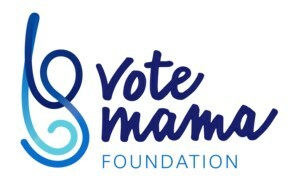VOTE MAMA FOUNDATION PUBLISHES STATE OF MOTHERHOOD REPORT
First of its kind research has produced the largest and most complete demographic dataset of moms who serve as state legislators in the U.S.
Findings show only 5.3 percent of state legislators are mothers with children under the age of 18
NEW YORK, Oct. 19, 2022 /PRNewswire/ -- Today Vote Mama Foundation, the leading source of research and analysis about the political participation of mothers, released the findings of its State of Motherhood report.
State of Motherhood was launched in early 2022 to answer a seemingly simple question: how many mothers with young children are serving in state legislatures? This question proved difficult to answer. Despite the fact that gender equity in politics is a widely researched topic, there has been no data available on the representation of mothers serving as state legislators — until now.
The findings from the State of Motherhood survey reveal dismal representation of mothers in state legislatures with mothers of minor children comprising just 5.3 percent of all state legislators.
Only 7 states have even half the number of moms with kids under 18 that are needed for full representation. Oregon is the only state legislature with full representation of moms with minor children, and Alabama currently has no mothers of young children serving in its state legislature. In order to achieve the goal of full representation, Americans need to elect 926 more moms with children under the age of 18 to state legislatures across the United States. State by state representation rankings and data are available here.
The findings from State of Motherhood indicate that the lack of representation of moms with minor children is the result of structural marginalization rather than individual circumstances or preferences. Further, it suggests that moms of young children face structural barriers that are unique, or intensified, compared to women and mothers of adult children.
"Moms know the challenges that women, kids, and working families face at a visceral level. However, we are often unheard because we are systemically kept out of the conversation, out of office, and out of power. Legislators as a collective body tend to be whiter, wealthier, and older than the communities they represent, and they are charged with solving challenges most have never personally faced. As State of Motherhood proves, we are missing a critical voice at the decision-making table — we are missing the voice of moms," said Liuba Grechen Shirley, Vote Mama Foundation Founder and CEO. "As voters start to head the polls for the midterms and gear up for the 2024 Presidential cycle, data is important. Mothers comprise an all-but-unexplored population in research that is critical to understand, not just as a subpopulation of women, but as a distinct population in its own right that is integral to a well-functioning government and to achieving gender equity in politics."
"The data presented in our State of Motherhood report is long overdue, but it is just the beginning of our collective understanding of what it means to be both a legislator and a caretaker," Grechen Shirley added. "Beyond making state legislatures full-time and paying legislators a livable wage, we also need to provide funds for them to hire staff, and allow candidates and legislators to use the funds they are raising on campaign related child and dependent care. We need predictable hours, virtual voting and committee hearings, and reasonable voting schedules. We need paid family leave for state legislators, changing tables and pumping rooms in statehouses, and affordable on-site childcare. Vote Mama Foundation works to change outdated policies that create these structural barriers, modernize state legislatures, and ultimately make it easier for moms to run and serve."
With detailed demographic data on women and nonbinary state legislators now publicly available, Vote Mama Foundation will continue to expand its research in identifying, analyzing, and breaking down barriers that systematically exclude moms with young children from accessing political positions of power. Vote Mama Foundation has already begun collecting demographic data on federal legislators, and the focus of the next report in the State of Motherhood series will be the 118th U.S. Congress.
To learn more about Vote Mama Foundation and the State of Motherhood project, visit votemamafoundation.org
Background:
Prior Vote Mama Foundation research revealed that just 7% of Congressional representatives in the 117th Congress are mothers with minor children.
About Vote Mama, a comprehensive platform for moms created by Liuba Grechen Shirley:
Vote Mama Foundation: A 501(c)(3) non-partisan, non-profit organization that fights to normalize moms with young children running for and serving in elected office by identifying and breaking down the structural barriers that hold moms back. It has successfully legalized the use of Campaign Funds for Childcare in 26 states, so far. Vote Mama Foundation is also the leading source of research and analysis on the political representation of mothers in the United States.
Vote Mama PAC: The first Political Action Committee in the U.S. dedicated to electing Democratic moms across the country, from School Board to Senate. Women, particularly moms of young children, face unique challenges when running for office. Vote Mama PAC seeks to build the political power of moms through endorsement, coaching, mentorship, and financial contributions. Since launching in 2019, Vote Mama PAC has helped more than 400 Democratic moms run for office in 31 states.
Vote Mama Lobby: A 501(c)(4) organization and political empowerment platform that inspires and engages moms to volunteer for mama candidates and advocate for truly family-friendly legislation, and gives Democratic candidates and elected moms the opportunity to connect and share resources.
CONTACT: Elise Anderson; [email protected], (214)-490-7003
SOURCE Vote Mama

WANT YOUR COMPANY'S NEWS FEATURED ON PRNEWSWIRE.COM?
Newsrooms &
Influencers
Digital Media
Outlets
Journalists
Opted In




Share this article